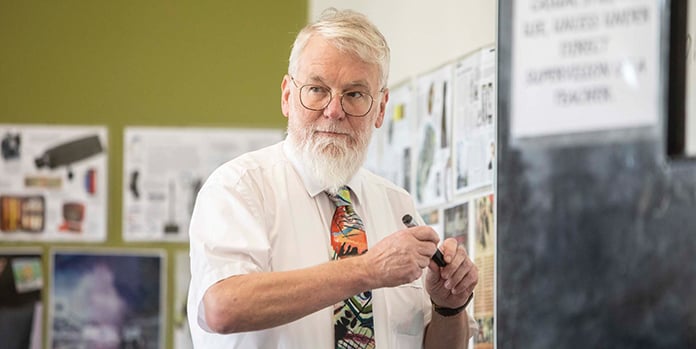From the very beginning of a student’s schooling in Prep, he or she will be thrilled by the great stories drawn from history. One of the greatest joys of my teaching career has been to teach History and to see young minds enthralled by my virtual walks through the penumbrous tombs of ancient Egypt or the luminously beautiful cities of Renaissance Italy.
Teachers do not have to cultivate a love of history: it is already innate and present. We merely have to ensure that we do not do anything to spoil it. This continues on into the senior years when the pressures of course selection and career paths become more germaine.
Scenario: Evening, Melbourne Grammar School, parent teacher night, the Nigel Peck Centre for Learning and Leadership. An anxious parent asks a teacher of History: “So, what jobs will your history subject open up for my child?” The teacher might make the mistake of trying to list specific existing jobs – such as journalism, publishing or diplomacy
– where historical skills are indeed more obviously and demonstrably useful.
But according to the Department of History at the University of Melbourne, the more likely answer – to which I most willingly contributed at the time – would rather be: “All of them”. This startling assertion is predicated not on the content and themes of history itself, but upon an awareness of the real demands of the modern workplace. The content of history might be about the past, but the skills will resonate most powerfully in the present and the future.
First, the age of the ‘one life-one career’ is slipping away. Careers experts warn our students that they may find themselves moving fluidly from one job to another, some of which do not even exist yet and cannot be predicted. This means that job-specific training might be of less use, and that graduates will quickly find that they need a set of very generic workplace skills that can be easily applied to very different situations.
Thus, for example, a history graduate might have conducted research into subjects as diverse as ancient Egypt or the causes of WWI, yet never mention a word of it in their eventual workplaces. The same graduate might, however, be surprised and gratified that he or she shines in the workplace by virtue of their finely-honed skills of research, analysis and, above all, literate and articulate communication.
Second, while the jobs of the future might be unpredictable, the demands of the future diverse workplaces are not. Employers repeatedly find that there is an intense need for workers who can read and analyse large amounts of information, who can construct arguments and draw conclusions, and, above all, who can communicate them effectively and clearly.
In particular, the previous traditional problem for businesses of lack of information has now been erased, in our electronic age, by the problem of a massive overload of too much information, some of it seriously incorrect.
Crucially, the history graduate can identify and evaluate differing points of view and explain their origins and motives. This is not to suggest that other disciplines do not also teach valuable skills, but those of history are especially adaptable to the workplace.
For example, History is a subject that depends on analysing primary sources (documents created at the historical moment being studied) and secondary sources (documents created after the historical period being considered). It depends absolutely on the scrupulous checking and rechecking of factual evidence, and of a judicial, penetrating analysis of different points of view of the same event.
Finally, historians are trained to study humanity, how humans behave, and how human society works. They are humanists, not technocrats. While an engineer or an architect might plan the nuts-and-bolts mechanisms of some massive development project, there is a need for skills in the workplace that can predict, identify and manage the human impact.
In some cases, historians refer to lessons from the past. As our society struggles to deal with the pandemic situation in 2021, we might draw very interesting conclusions from the precedent of what Australia did – with amazing success – to combat the deadly Spanish Flu virus in 1918 – 1919, which killed more people than WWI itself.
In conclusion, teachers of History might well reconfigure the profound words of one writer, who memorably wrote: “The past is a foreign country. They do things differently there.” But, for the young people in our care, and who are preparing for a dynamic workplace, we might more accurately rephrase this as: “The future is a different country, and they will do things differently there.”
For that chameleon future, the analytical skills of the historian will provide a toolkit that will never fail to adapt to even the most radical changes in the world that lies ahead of us.
Dr Michael Adcock
About Michael Adcock
Dr Michael Adcock has been the Head of History in the Senior School at Melbourne Grammar School since 2010. Prior to this Michael was a lecturer in History at the University of Melbourne. He holds a Bachelor of Arts (French and History), a Master of Arts (French History) and a Doctor of Philosophy (French History). As a historian who specialises in 18th to 20th century Europe and the political role of art in times of rapid social change, Michael regularly leads European study tours.



